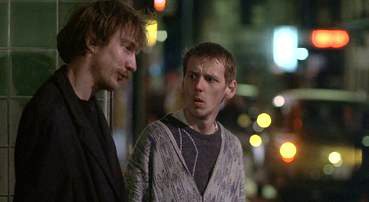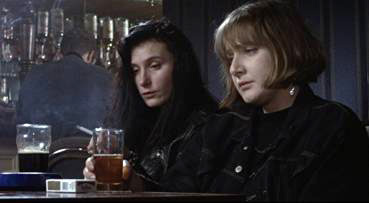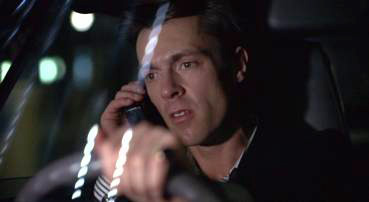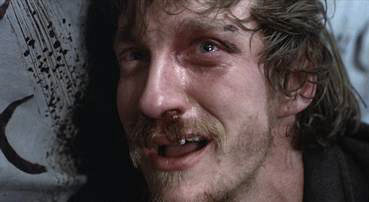"Don't
waste your life." |
Security Guard Brian
to Johnny |
A few years ago, I was charged with transporting a group of media students across London to the Odeon Leicester Square to attend a special preview of Richard Attenborough's The Grey Owl, which was followed by a Q&A with the man himself. We weren't, I'm sorry to say, particularly enthralled by the film, but Mr. Attenborough was on fine form and answered audience questions with honesty and good humour, and the students were genuinely starstruck in his presence. I have a terrible sense of direction, and despite knowing central London rather well, once we'd been dropped off I tried to save time (we were running really late) by taking what I thought was a short-cut and got completely lost. Eventually, more by luck than design, I found myself in a familiar part of Soho, and as I was hiding a sigh of relief under some waffle to the students about this being a key area for the London film industry, I spied a short, bearded man heading in our direction. It was Mike Leigh, presumably on his way to a production meeting, a sound mix, or even an early lunch. He had walked past me before I had a chance to realise the opportunity I had missed, to briefly meet and perhaps even shake the hand of a man I had for years regarded as one of British film's most crucial talents. It still smarts. And Mr. Leigh remains to this day blissfully unaware that this moment between us never passed.
As a long time admirer of Leigh's film work, I have become used to being made feel uncomfortable by his characters. Leigh is a master at that. There are plenty of examples: the twittery Keith and Candice Marie in Buds in May, the snooty Martin and Valerie Burke in High Hopes, the neurotic Nicola in Life is Sweet, just about everyone in Who's Who, and, of course, the irrepressible Abigail in Abigail's Party. I could go on. All of them are compelling film characters, but not people you'd want to spend an evening in the company of. None of them, however, proved adequate preparation for my first viewing of Naked. Where aspects of the earlier films had got under your skin, Naked confronts you head on and spits in your face. As a film experience, it has managed to piss off a sizeable proportion of its audience, and at our cinema screening there were some very vocal walk-outs and a fair number of post-screening complaints. What do you say to these people? Sorry? We obviously weren't going out of our way to offend anyone by screening the film, but equally felt no inclination to apologise for doing so. Yes, it could and did cause offence, and yes, it is sometimes very difficult viewing. But Naked is still a searingly powerful, brilliantly realised study of lives in lonely, nihilistic and self-destructive nose-dive in a modern urban society, and one of the dramatic peaks of Leigh's remarkable cinematic career.

Central to the situation – story plays but a small supporting role here – is Johnny, a thoroughly unlikable (some might even say detestable) but intelligent and, crucially for the film, enigmatic outsider whose sole goal in life appears to be to engage in verbal sparring matches with those he holds in contempt, which appears to include just about everyone he meets. A perennial smart-arse with an almost uncontrollable gift for winding people up, he is the class clown taken to neurotic extremes, a bedraggled user who feeds off of others – intellectually, physically, materially – then discards them and moves on, showing no sense of fulfillment, his conscience never ruffled.
We are introduced to him in a jittery hand-held shot that catches him engaged in rough sex in a Manchester back alley with a woman who is protesting enough to suggest this is turning into rape. She breaks free and he runs for it, stealing what is probably her car and driving to London, landing on the doorstep of ex-girlfriend Louise but encountering instead her dazed flatmate Sophie, whom he immediately seduces.
Herein lies the first major difficulty for all but the most insensitive audiences. Women do not fare well in Naked and are presented almost exclusively as victims, a role in which they are repeatedly abused – verbally, physically and sexually – and which is made possible because they are largely presented as weak, lost, drugged out or fucked-up. And it's not just Johnny who is abusing them. Running parallel to his story is that of Jeremy, Louise and Sophie's thoroughly nasty posh-boy landlord, who treats women with an even greater level of contempt than Johnny and regards their violent mistreatment as an amusing game. There have been few characters in film history you want to slap six ways from Sunday more than our Jeremy, but for many he is also the film's second substantial problem. Although creating a thoroughly obnoxious upper-middle-class bastard was clearly the intention of both Leigh and actor Greg Cruttwell, there is, on the surface at least, something jarringly artificial about him – Jeremy's superior sneering and carefully delivered verbal nastiness at times feels only a few steps away from the dastardly, moustache-twiddling villainy of pantomime. On the commentary, Leigh defends the portrayal, assuring us that people like Jeremy definitely exist, and it's hard for me to argue otherwise, as I don't move in the world that the likes of Jeremy inhabit, whereas Johnny, Louise and even Sophie are all too real to me. Jeremy feels almost like he has wandered in from another film, or even another world, but that appears to be precisely the point, and one that successive viewings have helped to clarify.

If there seems little good in Johnny when we first meet him, when he hits the London streets a few traces of humanity begin to emerge from beneath the anger and we start to engage with him as a person, to actually root for him in spite of his continued determination to confront. His encounter with wild young Scotsman Archie (a superb performance from a young Ewen Bremner) is actually touched with humour, and a meeting with Archie's girlfriend Maggie reveals an empathic side to him that is quietly disarming. But it is Johnny's philosophical arguments with lonely security guard Brian that emerge as the film's dramatic centrepiece, notably a single, three-minute shot in which Johnny ferociously outlines his evidence for the approaching apocalypse, including a persuasive argument for product bar codes as the modern manifestation of the sign of the beast as prophesised in the Book of Revelations. It's a meeting that has a profound effect on Johnny's debating partner, but in by-then typical fashion, Johnny's parting gift is to visit a woman the guard has been secretly spying on and aggressively seduce her, or at least make moves to – the conclusion to their encounter is hurtful, but not quite what earlier such scenes have led us to expect. A subsequent meeting with a young café worker strips Johnny's hostility back still further, but another unexpected turn brings it back to the fore, an almost autonomic defence mechanism employed to distance himself from someone he has actually, just for a short time, developed positive feelings for.
By the final act, when Johnny, beaten and showing further signs of both physical and mental disintegration, returns to a flat still under Jeremy's domination, we may still be infuriated by him but have nonetheless engaged with him enough to genuinely care about his fragile well-being. In a surprisingly tender scene between him and Louise, we finally glimpse the man that Louise once fell in love with, the caring person that he presumably once was. Even here we are misdirected, as we are set up for an ending that just does not play out as narrative convention decrees that it should, but which makes perfect sense in the context of Johnny's three-day odyssey.
On its initial UK release. the film and its director caught some serious critical flak, with charges of misogyny leveled at both, and it's easy to see where this was coming from. I should point out that almost all of the walk-outs that occurred at our cinema screening were women who were clearly unhappy with what was unfolding on screen, one group departing during a later rape scene with the loud shout, "This is bloody ridiculous!" As a male viewer, I am always uncomfortable with the idea of arguing in defence of negative attitudes and actions perpetrated by my gender, but I would still propose that a film that contains misogynistic characters is not itself necessarily guilty of misogyny. The self-fulfilling prophecy that so dominates Johnny's thoughts is reflected in the characters, with women deemed to suffer in part because of the perceived necessity of the male characters to constantly and forcibly establish their own primitive sense of masculinity. Thus, both Jeremy and Johnny miss no opportunity to enforce their gender dominance through verbal and physical aggression, and both seem preoccupied with an almost primal need to spread their seed. In Naked, sex is all about power and never appears to bring even an ounce of pleasure – Johnny fucks, Jeremy rapes, but neither appear to possess the capacity to make love, at least not any more. Crucially, the closest Johnny comes to communicating on even the most basic physical level is when, beaten and wide-eyed, he reaches out to Jeremy, who reacts with instant disgust and hostility.

Although in this world of regressive relationships between the sexes the women are victimised, they are at least aware of their position, something that cannot be said for the men. Where the behaviour of Johnny and Jeremy seems driven by a seemingly subconscious fear of masculinity loss, Louise and Sophie have almost accepted their fate and have learned how to survive it, or at least think they have. Sophie in particular, so desperate for emotional contact that she would rather be physically hurt than be alone or ignored, appears trapped in a negative emotional cycle. As Jeremy roughly grabs her, she mutters wearily to herself, "Here we go...," a resigned acceptance of a fate she has come to regard as inevitable, and that she simply now does not have the strength nor will to break free from. With this in mind, it seems absolutely right that the film is sometimes difficult to watch – we should be irritated and angered by these characters and these situations, because they existed back in 1994 and continue to do so today. There is a strong sense here of wasted lives, of essentially good people who have been dragged down by society or circumstance or even each other. And you know what? That can happen to anyone, and I do mean anyone.
Which brings us to the third charge that was leveled against the film on its release, that it was unrelentingly bleak, a view which not only ignores the moments of unexpected but genuine tenderness, but also the arrival back from holiday late in the narrative of third flatmate Sandra. A glorious creation by Claire Skinner (who was also so engaging as the boyish Natalie in Life is Sweet), she is so befuddled by the mess she returns to that she is unable to complete sentences and seems to be manipulating her speech control centre with puppeteering hand movements. This provides the film with a string of laugh-out-loud character moments and some light relief from the scenes that have immediately preceded it.
But yes, the film does take us to dark places and push our faces in some of the more unpleasant aspects of human nature, and it would definitely be hard going at times but for one crucial thing: the performances. Anyone familiar with Leigh's cinema will by now know of his singular approach to film preparation, which involves working with the actors on lengthy improvisations over a period of weeks, out of which the story and script and the fine details of character evolve. We have also come to expect the performances in Leigh's films to be of a particularly high calibre, but never have we been presented with one as explosively brilliant as that delivered here by David Thewlis as Johnny. It is difficult to describe how utterly and completely Thewlis gets inside Johnny's skin, creating a character who is unglamorous, unpleasant, angry, spiteful and exploitative, and yet also compelling, intelligent, articulate, lost, sad and – crucially – very, very human. It is screen acting at its blistering, dangerous best, and so perfectly tuned to the tone of the film that it is impossible – and I mean that in its literal sense – to imagine Naked working at a fraction of its power without him. It is to the considerable credit of his fellow actors that this performance does not eclipse their own efforts, with Leslie Sharp as Louise, the sadly missed Katrin Cartlidge as Sophie, Peter Wright as Brian, Deborah MacLaren as Helen (the Woman in the Window) and Gina McKee as the suicidal Café Girl all hitting just the right note, and even if I'm still not sure about Greg Cruttwell's Jeremy, he certainly makes his mark.

With British cinema increasingly in danger of pandering
too enthusiastically to the export market, it is refreshing
to remind ourselves that one of the very finest films
of the last decade was not only British, but found acclaim
in the US purely on the basis of its qualities as drama
rather than a simplistic, tourism-driven idea of
'Britishness'. Naked is not easy
viewing, nor should it be given the subject matter and
characters, but it remains a magnificent, compelling work
that showcases great actors and a very great director
all at the top of their remarkable form.
| sound and vision |
Given my preference for independent cinema, I am quite used to prefacing this section with talk of low budgets and fast film stocks and coarse grain, but the transfer on this Criterion disk has effectively rendered much of that redundant. Naked was clearly made on a small budget, but the picture here is close to reference quality, a glorious transfer that is pin sharp without obvious enhancement and whose contrast and black levels are spot on, while the reproduction of the film's toned-down colour scheme a delight. Despite being set mainly at night or in dour interiors, compression artefacts are rarely visible, and grain, though present, is minimal. A superb job.
The framing is 1.85:1 and anamorphically enhanced. The original laserdisc release was 1.75:1 and although the original aspect ratio is listed on the DVD credits as 1.85:1, the IMDB has it as 1.66:1, suggesting some cropping. It has to be said that the framing never feels remotely cramped, though, and the transfer was supervised and approved by Leigh himself.
The Dolby 2.0 surround track may not have aggressive separation or use the rears for much more than to support Andrew Dickson's haunting score, but the clarity and quality is otherwise first rate. Pretty much a faultless job all round.
| extra features |
This is in some ways a DVD re-issue of Criterion's 1994 laserdisc release, and includes the commentary track from that disc by director Leigh and actors David Thewlis and Katrin Cartlidge. I, for one, am happy with that decision. Not only is it an excellent track, providing insights into the preparation, rehearsals and shooting of the film and Leigh's response to some of the negative reactions on its release, but it also preserves for posterity Cartlidge's contribution following her untimely death in 2002. Leigh and Cartlidge have clearly been recorded together, with Thewlis's contributions edited in at the appropriate points.
All of the other features are on disk 2.
The Heart of the Matter: Neil LaBute on Naked (12:43) is an interview with the director of In the Company of Men and someone who thus has some experience of charges of cinematic misogyny. LaBute is a big fan of the film and provides an interesting viewpoint on its qualities and controversy. This is new to the DVD edition and was recorded in 2005.
Also new to this release is The Art Zone: The Conversation, an episode from the BBC2 arts series (complete with BBC2 ident) from 2000 in which acclaimed writer and Mike Leigh enthusiast Will Self interviews the director in his favourite café (and not a pub, as suggested on the text intro). Self is a very perceptive and enthusiastic interviewer who appears to understand just what Leigh's work is all about, and the programme thus makes from fascinating viewing. The framing is anamorphic 16:9 and the transfer quality is excellent.
Finally The Short and Curlies (17:07) is a short film made by Leigh to TV in 1987 and stars Alison Steadman, Sylvestra Le Touzel, David Thewlis and Wendy Nottingham. A bittersweet comedy built around the developing relationship between geeky Clive and shop worker Joy and the disintegrating one between hairdresser Betty and daughter Charlene, the characters, in typical Leigh fashion, prove both funny and infuriating. This is especially true of Thewlis's Clive, who like Johnny is fond of the sound of his own voice, but whose method of seduction here is to relentlessly bombard his prey with terrible jokes. As with Johnny, the character springs very much from reality, which is probably why I wanted to hit him. Terrific stuff, framed non-anamorphic 1.66:1 and not quite as pristine as the other visuals on display on this disk. As a bonus, this short also comes with an optional Mike Leigh commentary, which is both informative and entertaining.
Not on the disk but a worthy inclusion is a booklet that includes two new essays on the film by critics Derek Malcolm and Amy Taubin.
| summary |
What can I say? One of the finest British films of the modern age given pretty much superlative treatment by Criterion. As someone who has complained at the splitting of film and extras onto two disks for purely commercial purposes ("It's a two disk special edition!") I nonetheless applaud the decision to do so here, freeing disk space as it has for a transfer whose bitrate rarely drops below 9. Great picture, fine sound, good extras – an absolute must for fans of essential British cinema.

